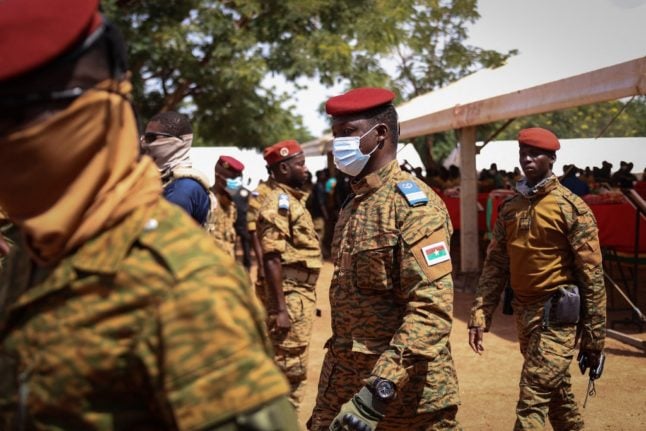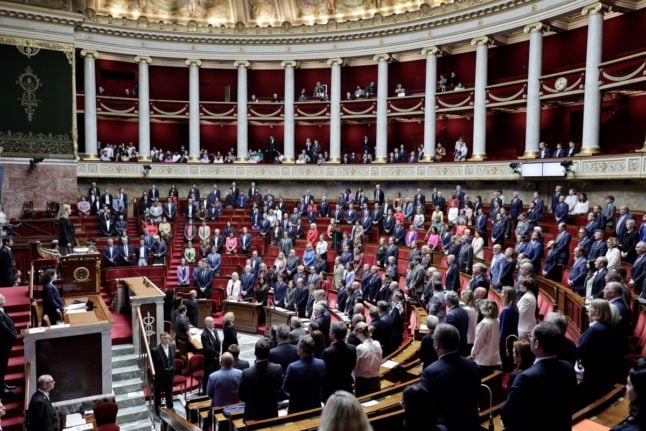“The Burkinabe government last Wednesday denounced the accord which has governed, since 2018, the presence of French armed forces on its territory,” AIB said, adding that authorities had given France a month to complete its pull-out.
A source close to the government clarified it was “not the severance of relations with France. The notification only concerns military cooperation agreements”.
France has 400 special forces soldiers stationed in junta-ruled Burkina to battle an Islamist insurgency, but relations have deteriorated in recent months.
Sources familiar with the matter told AFP that France’s preferred option would be to redeploy its forces in the south of neighbouring Niger, where nearly 2,000 French soldiers are already stationed.
The military junta, led by Captain Ibrahim Traore, seized power last September in the second coup in the former French colony in eight months.
Traore’s regime has been seeking to rekindle ties with Russia since his coup.
French troops withdrew from Mali last year after a 2020 coup in the former French colony saw its rulers also inch closer to Russia.
Demonstrations
Demonstrators gathered in Burkina’s capital Ouagadougou on Friday to demand the French ambassador leave the country and that the French military base there be closed.
Several hundred flocked to a central square carrying placards with slogans such as “French army, get out”.
Mohamed Sinon, one of the main leaders of the collective that called the demonstration, said it was to show support for junta leader Traore and the security forces fighting jihadists.
“We are a pan-African movement and we want cooperation between Burkina Faso and Russia, but also the strengthening of friendship and of cooperation with Guinea and Mali,” he added.
Protesters carried huge posters showing the presidents of Mali and Guinea — both of whom also came to power in coups — as well as Russian President Vladimir Putin.
In October, anti-France demonstrators gathered outside the country’s embassy in Ouagadougou and the French cultural centre was attacked.
Another demonstration outside the embassy followed in November, and earlier this month, the French foreign ministry said the junta had asked it to replace ambassador Luc Hallade after he ruffled feathers with reports on Burkina’s worsening security situation.
‘Brother country’ Mali
Burkina Faso on Saturday thanked its northern neighbour Mali for its help in the recent rescue of 66 women, children and babies from suspected jihadists after a week of captivity.
Government spokesman Jean-Emmanuel Ouedraogo also told RTB state television that all of the 66 freed captives, who included 27 minors and four babies, were doing well.
“All arrangements have been made for them to regain serenity and after all that, we can consider their return to their respective families,” he added.
The captives were abducted by suspected jihadists in the northern Sahel region a little over a week ago.
During his televised interview, Ouedraogo paid tribute to “brother country” Mali, saying it had monitored their shared border “so as to be able to follow the trail of the kidnappers and the women”.
Both countries are fighting a long-running jihadist insurgency that has claimed thousands of lives and forced millions to flee their homes.
Earlier Saturday, several hundred people demonstrated in two major northern towns, Djibo and Kongoussi, both of which have been subjected to jihadist raids and a blockade that has made it increasingly difficult for them to receive supplies.
The demonstrators called for fresh supplies and thanked security forces for rescuing the women.
The demonstrations came just two days after a series of attacks across the north of the country claimed the lives of around 30 people, half of whom were members of an auxiliary force supporting the army.
Traore said in December that his aim was to “recapture the territory occupied by the hordes of terrorists”.



 Please whitelist us to continue reading.
Please whitelist us to continue reading.
Member comments